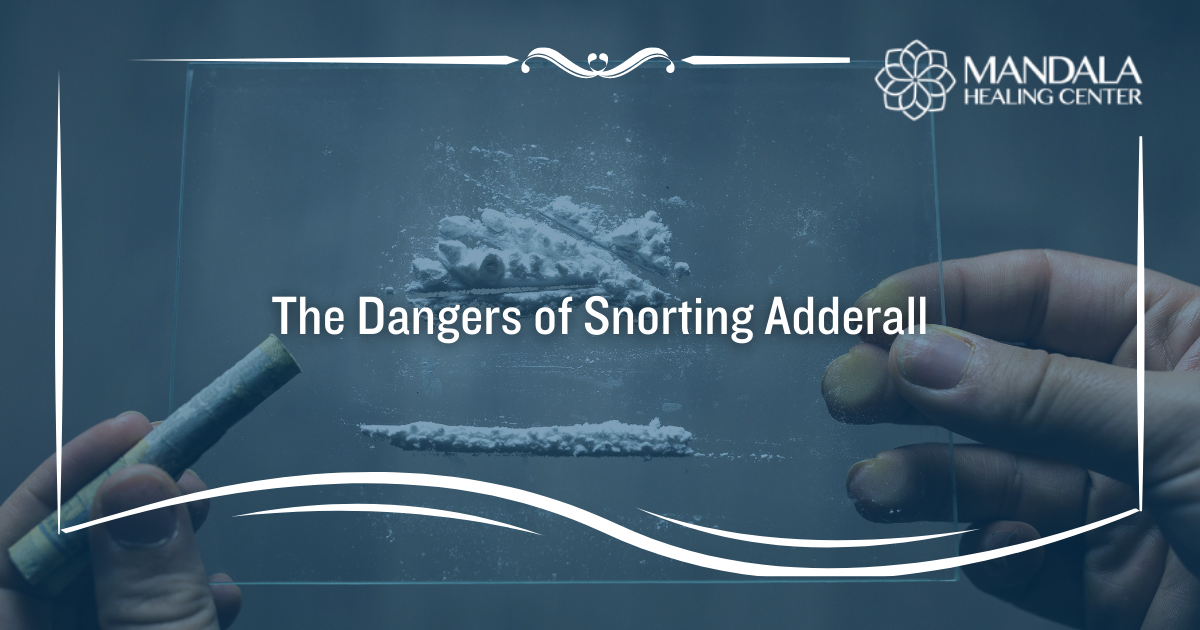Adderall is a prescription drug that is used to treat attention deficit hyperactivity disorder (ADHD). Because Adderall is a stimulant, many people without ADHD abuse this drug to enhance focus and increase energy.
This is why a large majority of individuals who abuse Adderall are college students who use the drug to stay awake and study for long hours. According to research, 60% of nonmedical Adderall abuse was among 18 to 25-year-olds.[1]
Oftentimes, the people who abuse Adderall prefer to snort the drug. This can lead to an array of adverse health reactions and speed up the cycle of tolerance, dependency, and addiction. Snorting Adderall can also lead to a variety of devastating health problems.
Why Do People Snort Adderall?
Individuals who abuse Adderall may snort the drug to achieve a faster and more potent high. When someone snorts Adderall, the substance reaches the brain faster than it would if taken orally. Once it reaches the brain, the drug interacts with the neurotransmitters norepinephrine and dopamine, leading to symptoms of euphoria, increased energy, and other psychological effects.
The immediate side effects of snorting Adderall include:
- A rush of euphoria
- Increased energy and alertness
- Increased heart rate
- Rapid breathing
- Increased blood pressure and body temperature
- Reduced appetite and weight loss
- Issues with sleep (insomnia)
- Nausea and vomiting
- Upset stomach
- Dry mouth
While many individuals snort the drug to experience an immediate high and intense rush of euphoria, doing so is very dangerous. Snorting Adderall can lead to several health issues, including damage to the nasal passages, nose bleeds, cardiovascular complications, and even life-threatening seizures or overdoses.
What Happens When You Crush and Snort Adderall?
Most Adderall pills are extended-release. This means that they are covered with an enteric coating that serves as a barrier to prevent an individual’s stomach acids from dissolving the drug too quickly. This allows the pill to provide individuals with small doses of the medication throughout the day, rather than releasing all of the substance at once and overwhelming the individual’s system.
When someone crushes an extended-release Adderall pill, they are destroying the enteric coating. Once they snort the crushed-up pill, there is no barrier to prevent the entirety of the substance from releasing at once. This causes Adderall to affect the brain almost immediately and cause an extremely potent effect.
Dangers of Snorting Adderall
Snorting Adderall can lead to dangerous medical complications. This is especially true for individuals who frequently use the drug on a long-term basis.
Nasal Damage
Adderall insufflation will experience damage and irritation to their nasal passages. This can lead to frequent nosebleeds, dry or flaky skin, and soreness in the nose.
Individuals who continuously snort Adderall will experience more severe nasal damage. Over time, their septum can begin to deteriorate due to frequent damage and irritation. This can cause them to develop a hole where their septum should be, increasing their risks of infection.
Lastly, chronic sinusitis is a common issue among individuals who frequently snort pills. Symptoms of this condition include:
- Thick and discolored nasal drainage in the back of the throat
- Tenderness, pain, and swelling in the nose, eyes, cheeks, and forehead
- Reduced ability to smell
- Nasal congestion and obstruction
Respiratory and Cardiovascular Issues
Snorting Adderall can cause elevated blood pressure. When an individual has high blood pressure, their respiration rates can become impacted.
When someone snorts toxic amounts of Adderall their body begins to have a difficult time oxygenating blood. This makes it difficult for them to breathe correctly. Additionally, this puts a significant strain on the cardiovascular system, sometimes leading to heart failure.[2]
Damage to the Brain
Adderall is a central nervous system stimulant. Because of this, it has the potential to cause significant damage to an individual’s brain. This is especially true for individuals who snort it, as the substance is immediately affecting the brain and bloodstream without being metabolized beforehand.
Changes in brain functioning due to Adderall abuse may include:
- Psychosis
- Hallucinations
- Seizures
- Strokes
- Coma
Overdose
Because snorting Adderall causes an extremely potent effect, individuals are at a high risk of experiencing an overdose. Adderall overdoses can be extremely dangerous and potentially life-threatening without immediate medical intervention.
The signs of an overdose include:
- Aggression
- Anxiety or panic
- Blurry vision
- Disorientation
- Hallucinations and delusions
- Rapid breathing and heart rate
- Uncontrollable shaking or tremors
- Fever
- Upset stomach and diarrhea
- Fatigue
- Muscle weakness
- Rhabdomyolysis (muscle tissue breakdown)
- Dark red or brown urine
- Fainting
- Seizures
- Loss of consciousness
- Death
If someone is displaying the signs of an Adderall overdose, emergency medical services must be contacted immediately.
Find Help for Adderall Abuse and Addiction Today
Adderall abuse can quickly lead to addiction, especially if you are snorting the substance. If you or a loved one suffer from an addiction, professional addiction treatment is necessary. The dangers of long-term stimulant medication abuse can become life-threatening, making it imperative for individuals to seek professional help.
Thankfully, treatment facilities like Mandala Healing Center are available to help you or your loved one recover from Adderall addiction. Contact us today for more information on how to get started.
References:












